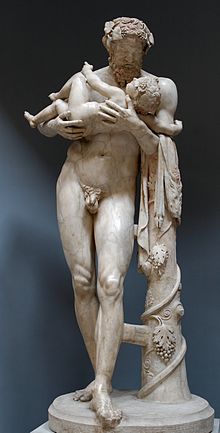
Silenus or Si·le·nos, Sei·le·nos [sahy-lee-nuh s] Examples noun, plural Si·le·ni [sahy-lee-nahy] /saɪˈli naɪ/ for 2. Classical Mythology.
- a forest spirit, sometimes referred to as the oldest of the satyrs and the foster father, teacher, and companion of Dionysus: often represented as a bearded old man.
- (lowercase) any of a group of forest spirits similar to satyrs: often represented as a drunken old man with the legs and ears of a horse.
Examples from the Web for sileni Historical Examples of sileni
Some Sileni of the throng sat on benches and hay-trusses by the wall; and one of them recognized her.
Thomas Hardy
The grape design at the base of the little statue, and the snake supporting the candleholder, both are symbols of the sileni.
Buried Cities: Pompeii, Olympia, Mycenae
Jennie Hall
And after them came two Sileni in purple cloaks and white fringes to them.
The Deipnosophists, or Banquet of the Learned of Athenus
Athenus
The p. xxxiiirevel of Dionysus was introduced by men disguised as Sileni, wild woodland beings in raiment of purple and scarlet.
Theocritus
The sileni mate with them, and Hermes, too, in the privy recesses of delightful grottoes.
J. H. Philpot
British Dictionary definitions for sileni Silenus noun Greek myth
- chief of the satyrs and foster father to Dionysus: often depicted riding drunkenly on a donkey
- plural Sileni (saɪˈliːnəɪ) (often not capital) one of a class of woodland deities, closely similar to the satyrs
Word Origin and History for sileni Silenus
1710, from Greek Seilenos, foster-father of Bacchus and leader of the satyrs; the name is of unknown origin (Klein compares Thracian zilai “wine”).
 Liberal Dictionary English Dictionary
Liberal Dictionary English Dictionary